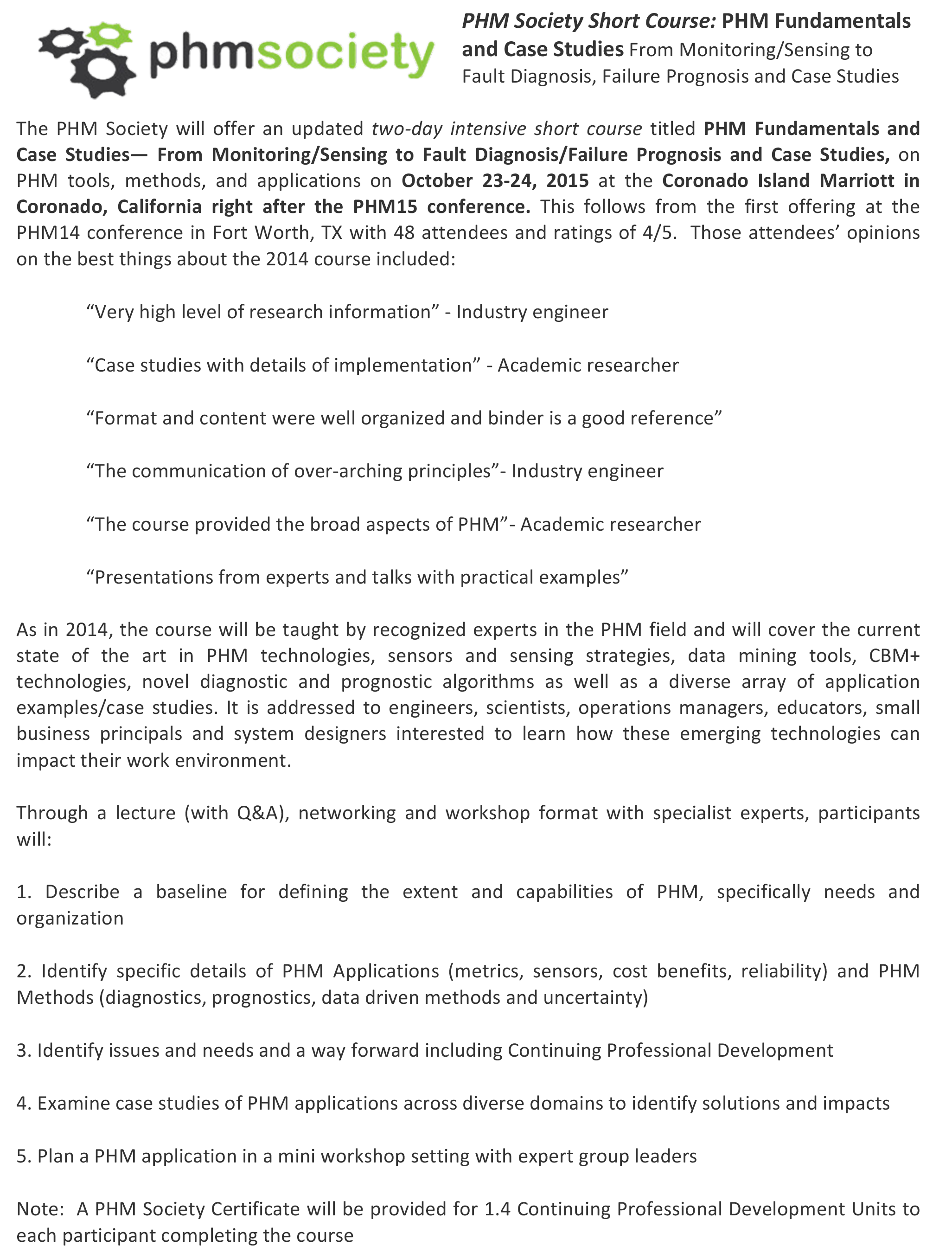PHM Society Short Course: PHM Fundamentals and Case Studies
Venue:
Venue information will be provided soon.
Registration
If you are interested in attending the short course, please register here.
Fees
| Registration Type | Early (until 8/12/16) | Regular (through 9/2/16) | Late/Onsite (begins 9/3/2016) |
|---|---|---|---|
| Professional Standalone | $925 | $1,075 | $1,225 |
| Professional with Conference Registration (add-on) | $525 | $600 | $675 |
| Student Standalone | $700 | $850 | $1000 |
| Student with Conference Registration | $275 | $325 | $375 |
About the Course
The course is presented by recognized experts in the PHM field and will cover the current state of the art in PHM technologies, sensors and sensing strategies, data mining tools, CBM+ technologies, novel diagnostic and prognostic algorithms as well as a diverse array of application examples/case studies. It is addressed to engineers, scientists, operations managers, educators, small business principals and system designers interested to learn how these emerging technologies can impact their work environment.
Through a lecture (with Q&A), networking and workshop format with specialist experts, participants will:
- Describe a baseline for defining the extent and capabilities of PHM, specifically needs and organization.
- Identify specific details of PHM Applications (metrics, sensors, cost benefits) and PHM Methods (diagnostics, prognostics, data driven methods, and uncertainty).
- Identify issues and needs and a way forward including Continuing Professional Development.
- Examine case studies of PHM applications across diverse domains to identify solutions and impacts.
- Plan a PHM application in a mini workshop setting with expert group leaders.
Note: A PHM Society Certificate will be provided for nominally 1.4 Continuing Professional Development Units to each participant completing the course.
Add to your PHM16 conference registration or come just for the course. Limited space so sign up now. Full details about cost and how to register can be found here.
Schedule
| Time | Topic | Speaker/Facilitator |
|---|---|---|
| 8:00 – 8:20 | Welcome and Introductions (All participants) |
Jeff BIrd |
| 8:20 – 9:00 | Introduction to PHM (Taxonomy, scope, basics, stadards common for all talks) |
Jeff Bird |
| 9:00 – 9:40 | Deriving Requirements for PHM (Basics and illustrative examples) |
Abhinav Saxena |
| 9:40 – 10:20 | PHM Performance Metrics (Basics and illustrative examples) |
Abhinav Saxena |
| 10:20 – 10:40 | Break – provided | |
| 10:40- 11:20 | Diagnostics Methods (Basics and illustrative examples, including uncertainty) |
Jose Celaya |
| 11:20 – 12:00 | Diagnostics Case Studies (2 case studies supporting diagnosis information) |
Abhinav Saxena and Jose Celaya |
| 12:00 – 1:00 | Lunch – provided | |
| 1:00 – 1:40 | Prognostics Methods (Basics and illustrative examples, including uncertainty) |
Matthew Daigle |
| 1:40- 2:20 | Data Analytics Methods (Basics and illustrative examples, including uncertainty) |
Neil Eklund |
| 2:20 – 3:20 | Prognostics Case Studies (2 case studies supporting prognosis information) |
Neil Eklund and Matthew Daigle |
| 3:20 – 3:40 | Break – provided | |
| 3:40 – 4:20 | Sensors and Data Processing (Available/Required Data and Organization) |
Karl Reichard |
| 4:20 – 5:00 | Analysis mini workshop (Small group data design activity with worksheets, participant problems) |
Jeff Bird and Neil Eklund |
| 5:00 – 5:15 | Summary of workshop results (Each group reports results) |
Jeff Bird and Neil Eklund |
| 7:00 onwards | Non-hosted dinner with all participants (Networking for all participants) | |
| 8:30 – 9:15 | CBM+ Technologies (Basics and illustrative examples) |
Karl Reichard |
| 9:15 – 10:00 | Cost Benefit Analysis (Basics, methods, and tools) |
Ravi Rajamani |
| 10:00 – 10:30 | Plenary – Issues and Needs (Review period to compile collected issues from all participants) |
George Vachtsevanos and Neil Eklund |
| 10:30 – 10:45 | Break – provided | |
| 10:30 – 10:45 | Reliability and Life Cycle Management | George Vachtsevanos |
| 12:30 – 2:00 | Fielded Systems Case Studies – 1 (2 case studies supporting CBM and CBA) |
George Vachtsevanos and Neil Eklund |
| 12:30 – 1:30 | Lunch- provided with evaluation forms | |
| 1:30 – 2:00 | Fielded Systems Case Studies – 2 (3 case studies supporting CBM and CBA) |
Karl Reichard |
| 2:00 – 2:15 | Case Study Workshop Introduction | Jeff Bird and Neil Eklund |
| 2:15 – 3:20 | Case Study Mini workshop (Small group activity that builds on data design mini workshop) |
Neil Eklund and George Vachtsevanos |
| 3:20 – 3:40 | Break – provided | |
| 3:40 – 4:00 | Way Forward (Issues, resources, including Continuing Professional Development) |
Jeff Bird and Neil Eklund |
| 4:00 – 4:15 | Wrap-up with Evaluation Forms | Neil Eklund and George Vachtsevanos |

